Flat Rate Shipping! Regular Post: $8 all over Australia & FREE for orders over $150!
Flat Rate Shipping! Regular Post: $8 all over Australia & FREE for orders over $150!

Cal-XTRA
Calcium and Bone Mineral Supplement for Horses Grazing Oxalate-containing Pastures
Cal-XTRA is formulated as a critical supplement for horses grazing in regions with oxalate-containing grasses, commonly in Queensland, The Northern Territory and parts of New South Wales and Victoria.
Tropical and sub-tropical grass, particularly setaria, para, buffel, teff, pangola, kikuya, couch grass and green panic, contain oxalates which bind up and reduce the absorption of calcium, resulting in calcium deficiency which can lead to bone weakness.
Cal-XTRA is a concentrated source of bone minerals, especially calcium, to ensure extra supply and help prevent bone demineralisation that would otherwise lead to lameness, osteoporosis and Big Head.
Horses on high grain diets also benefit from the calcium and other nutrients supplied by Cal-XTRA to help bone strength and soundness during moderate to intense training.
Product Information
Tropical and sub-tropical grass, particularly setaria, para, buffel, teff, pangola, kikuya, couch grass and green panic, contain oxalates which bind up and reduce the absorption of calcium, resulting in calcium deficiency which can lead to bone weakness.
Cal-XTRA is a concentrated source of bone minerals, especially calcium, to ensure extra supply and help prevent bone demineralisation that would otherwise lead to lameness, osteoporosis and Big Head.
Horses on high grain diets also benefit from the calcium and other nutrients supplied by Cal-XTRA to help bone strength and soundness during moderate to intense training.
Our Concept for Cal-Xtra
Kohnke’s Own Cal-XTRA is the result of more than 12 years of research and field trials by equine veterinarian and horse nutrition authority Dr John Kohnke, especially in the areas where horses are known to have poor calcium uptake and Big Head.
Cal-XTRA is highly concentrated and contains more palatable forms of calcium compared to ‘chelated’ calcium supplements, making it a superior and more economical choice.
It is scientifically formulated to protect calcium absorption in the presence of oxalates through a stable coating technology which shields calcium from oxalate binding with a specialised micro-coating process. This allows optimum calcium uptake to ensure bone strength and soundness, even when horses are grazing tropical grass pastures.
Our Concept for Cal-XTRA
Cal-XTRA is highly concentrated and contains more palatable forms of calcium compared to ‘chelated’ calcium supplements, making it a superior and more economical choice.
It is scientifically formulated to protect calcium absorption in the presence of oxalates through a stable coating technology which shields calcium from oxalate binding with a specialised micro-coating process. This allows optimum calcium uptake to ensure bone strength and soundness, even when horses are grazing tropical grass pastures.



Cal-XTRA ensures critical calcium supply when your horse is grazing tropical grasses
Which Horses Benefit?
Cal-XTRA provides high strength additional calcium and important bone minerals in cases where extra is needed, for example, during bone regeneration, or when rapidly growing tropical grasses are the dominant pasture type available to the horse.
- Horses in QLD and NT, where tropical and subtropical grasses such as setaria, para, buffel, pangola, kikuya, couch grass and green panic are at high levels in the pastures
- Horses in parts of NSW and VIC where kikuyu has invaded the pastures in coastal regions, causing osteoporosis and Big Head in horses even when owners don’t suspect it could be a problem
- In spring and summer (or for fertilised pastures), when grass growth is rapid and tropical grasses contain higher levels of oxalates
- Horses consuming predominately Teff hay or pangola hay which may contain high levels of oxalate chemicals
- For bone mineral needs in horses with high phytate dietary sources (including bran and certain grains)
- For horses with extra bone mineral needs, including those in regular work and with low lucerne diets.
- For horses suffering from bone demineralisation or Big Head.
Major Ingredients
Cal-XTRA is a concentrated source of important bone minerals, including calcium, phosphorus and magnesium in an optimum ratio to correct low or inadequate levels in the diets of growing, breeding, working or resting horses, especially those with a predominately grass-based diet.
- Provides balanced bone minerals to help ensure optimum strength and soundness of the skeletal system in all horses.
- Cal-XTRA is formulated with high purity calcium sources to optimise the important calcium to phosphorus ratio in horses.
- Cal-XTRA includes the important vitamins A and D3. Vitamin A is necessary for calcium utilisation in the growth and maintenance of bone.
- Vitamin D3 is involved in the regulation of calcium absorption to help bone development and maintenance of strong bones.
- Cal-XTRA does not contain trace-minerals, such as zinc, iron, copper and selenium, because uptake of these trace-minerals is reduced in the presence of high calcium in a calcium supplement.
- Cal-XTRA is not a full ration balancing supplement so it is recommended to provide a comprehensive nutritional supplement, such as Kohnke’s Own Cell-Provide, Cell-Vital or Cell-Perform, relative to the exercise level of the horse.
- Cal-XTRA is a palatable powdered supplement with a dense consistency which is easy to mix into all types of feeds, wet or dry.
Supplementation Guidelines
For horses at rest, provide 60 grams daily of Cal-XTRA when grazing tropical grass pastures during slow growth periods. Provide 120 grams daily during rapid growth periods or high oxalate pastures.
For ponies, provide half these amounts.
For working horses, provide 80 grams per day during slow growth periods, and 150 grams per day during periods of rapid growth. For ponies, provide half these amounts.
Seasonal Influences or Fertilised Paddocks
Rapid grass growth periods, for example in Spring and Summer, or when paddocks are irrigated or fertilised (especially with nitrogen and phosphate fertilisers), further increase oxalate production, thus it is especially important to provide Cal-XTRA to horses grazing in these conditions.
For Horses with ‘Big Head’
If horses have suffered bone weakness from grazing oxalate containing grasses, it is important to optimise Cal-XTRA supplementation. Our studies have shown that curbing grazing behaviour for approximately 1 hour before providing Cal-XTRA, and for 1 hour after the feed is consumed, will further optimise calcium absorption to correct deficiencies that have resulted in bone weakness. Where practical, remove the horse from the oxalate grass and provide the feed containing Cal-XTRA in a yard or stable to reduce pre- and post-feed grazing and ensure optimal calcium absorption from Cal-XTRA supplementation.
Combining Cal-XTRA with Lucerne Hay
Lucerne as a legume crop contains higher levels of calcium and magnesium compared to other common hay varieties. Each kilogram of lucerne as hay or chaff provides approximately 12 grams of calcium, thereby reducing the necessary supplementation rate of Cal-XTRA. For horses on high oxalate pastures fed 2 kg of lucerne per day (1 biscuit hay plus lucerne chaff in feed), provide 40 grams of Cal-XTRA per day for horses at rest and 60 grams daily for working horses (400-600 kg body weight). For more specific dose rates combining various rations with Cal-XTRA, contact our Nutritional Advisors at www.kohnkesown.com
Pack Sizes and Days Supply
5 kg bucket (83 days supply) available for $48.95 which is $0.59 cost per dose.
15 kg box (250 days supply) available from your local stockist at RRP $134.95 which is $0.54 cost per dose.
** Days supply is calculated from the 60 gram dose which is suitable for horses (500 kg body weight) grazing tropical grasses during slow growth periods. Prices are Recommended Retail Price (RRP) including GST (Australian Dollars). Prices may vary between different retailers.
What causes bone weakness in Aussie horses?
One of the causes of poor bone development in young horses and decalcification or bone weakness in adult grazing horses and ponies is the increasing growth of C4-type tropical grasses in many warmer and coastal regions of Australia. Tropical grasses, especially kikuyu, are spreading down the East Coast as the climate warms to sub-tropical conditions.
Oxalate chemicals are contained in the leaves of tropical and sub-tropical C4-type grasses and hays. Oxalates are compounds that reduce the absorption of calcium during digestion and can lead to a deficiency in calcium uptake from the diet.
Even short periods of between four and six weeks of poor calcium intake can lead to skeletal weakness, and in the longer term, potential health issues including osteoporosis, shifting lameness, teeth and jaw problems, joint issues, altered movement, and in severe cases, ‘Big Head’.
Which grasses are the most dangerous?
Oxalate chemicals are contained in the leaves of tropical and sub-tropical C4-type grasses and hays. Oxalates reduce the absorption of calcium during digestion and can lead to a deficiency in calcium uptake from the diet.
Grasses or hay that are high in oxalates include setaria, kikuyu, para, buffel, teff, pangola, couch grass and green panic. They’re common in grazing areas of Queensland, the Northern Territory and increasingly in coastal regions of NSW and Victoria. Horses consuming predominately Teff hay or pangola hay are also at risk of ingesting high levels of oxalates. If you’ve identified high oxalate grass in your pasture, supplementation with Cal-XTRA is recommended to add calcium and bone minerals back into the diet, helping reduce the risk of bone problems.
How does a calcium supplement help horses grazing oxalate grasses?
A concentrated calcium supplement is particularly important for horses grazing in regions of Australia where the pasture contains high levels of oxalates. Oxalates consumed by horses from the grass bind to calcium released in the small intestine and make it impossible for the horse to absorb calcium properly from their diet.
Reduced calcium uptake can result in it being taken from bone stores to maintain the important level of calcium in blood. This reduces bone density, causing osteoporosis or weakened bones, leading to shifting lameness, teeth and jaw problems, joint issues, altered movement and in severe cases, the condition known as ‘Big Head’.
Oxalate intake from grass cause both natural calcium in feed and added calcium in normal ration balancing supplements to be less available. Supplying a high purity, highly concentrated calcium supplement makes more calcium available from the diet and reduces the deficiency associated with poor calcium uptake from oxalate poisoning.
How long does it take for Big Head to develop?
Even grazing high oxalate containing grasses for 6 weeks can cause calcium demineralisation of the bones in horses. Often horses will not show symptoms of bone weakness but this may have already occurred. If you suspect that consuming oxalates has affected calcium absorption in your horse, we recommend feeding Cal-XTRA at the higher supplementation rate for 2-3 months to correct calcium deficiency and replenish calcium stores in affected horses.
When horses are showing symptoms of osteoporosis, bone weakness or Big Head, supplementation with the higher rate recommended on the Cal-XTRA label may need to be continued for 4-6 months to reduce the rate of bone demineralisation and help restore bone calcium content. In these cases, it is important to optimise Cal-XTRA supplementation to help replenish calcium stores in the bones for adequate strength and density.
What are the signs of bone weakness or ‘Big Head’ from high oxalate intake?
Early symptoms of bone demineralisation in horses from consuming high oxalate C4 grass species include intermittent or shifting lameness, failure of young horses to grow adequately to their expected height, clicking joints or weakness in the stifle and pelvis causing altered movement. Some horses may also exhibit poor hoof growth or quality. Horses will often have loose teeth and inability to chew food, or ‘slobber’ when eating.
More advanced signs include fracture of pelvic bones, ribs and splint bones, spinal column collapse and hind-limb in-coordination.
‘Big Head’ (Nutritional Secondary Hyperparathyroidism, NSH) is identified by the classic swollen forehead, nasal and jaw bones. Big Head is caused by bone weakness that allows the contents of the head to distort the softer and less dense facial bones.
Distortion of the nose from Big Head may cause noisy breathing due to restricted nasal passages, often with a nasal discharge from altered nasal drainage.
If you suspect that your horse may have osteoporosis, bone demineralisation or ‘Big Head’ from consuming oxalate-containing grasses, it is important to consult your veterinarian.
When are the ‘Big Head’ danger periods?
Rapid grass growth periods, for example in Spring and Summer, or when paddocks are irrigated or fertilised (especially with nitrogen and phosphate fertilisers), further increase oxalate production. It is especially important to provide Cal-XTRA to horses grazing pastures with C4-type species under these conditions.
Cal-XTRA has been formulated to provide different supplementation rates depending on the season, the workload and the pasture the horse is grazing. For example, a full sized horse at rest in a grassy paddock needs 30 grams daily for general bone mineral maintenance, 60 grams when grazing tropical grasses during ‘slow’ growth periods, and 120 grams per day when grazing tropical pastures during ‘fast’ growth periods.
Helpful advice for horses with bone weakness or ‘Big Head’
If horses have suffered bone weakness from grazing oxalate containing grasses, it is important to optimise Cal-XTRA supplementation to reduce the rate of bone demineralisation and help restore bone calcium content.
Our studies have shown that reducing grazing for approximately 1 hour before providing Cal-XTRA, and for 1 hour after the supplement is consumed, will further optimise calcium absorption to correct deficiencies that have resulted in bone weakness. Remove the horse from the C4 grass to minimise oxalate intake and provide a small hard feed containing Cal-XTRA in a yard or stable. This can help to reduce pre- and post-feed grazing and ensure optimal calcium absorption from Cal-XTRA supplementation.
In severe cases of osteoporosis involving the limb bones and joints of working and growing horses, X-rays of the bones to determine their relative density should be taken before the horse is put back into training. It can take up to 12 months for calcium stores to be replenished and re-mineralisation is completed. During this time, it is unwise to ride affected horses as bone fracture may occur.
Once the symptoms of ‘Big Head’ are established, further bone demineralisation can be halted by supplementing with calcium, phosphorus, magnesium, Vitamin A and Vitamin D, which are contained in Cal-XTRA. However, severe facial distortion cannot be reversed in adult or aged horses.
Is Cal-XTRA just for horses in QLD and NT?
It is not true that ‘Big Head’, or oxalate-linked bone weakness, is only a problem for horses in Queensland or Northern Territory. Kikuyu and other oxalate-containing grasses have now spread south to costal parts of NSW and Victoria, and many horse owners have reported horses suffering from osteoporosis and Big Head in these regions. Kikuyu is a common lawn turf grass and is resilient to hot weather and semi-drought climate conditions. Some horse owners like the hardy nature of kikuyu for grazing horses, but under warm, moist conditions in Spring and Summer, it can contain a higher, more dangerous concentration of oxalate chemicals.
If you suspect kikuyu is invading your pasture, we recommend supplementing with Cal-XTRA once this grass has been identified, particularly during Spring and Summer high growth periods. This is especially important if your horse is not consuming lucerne hay which will naturally supply some of the bone minerals needed to offset oxalate consumption.
Do other Horses Benefit from Cal-XTRA?
Calcium is an essential supplementary mineral for horses, required at 20 – 40 grams per day for a mature horse in light to intense work. Growing horses also require adequate calcium for bone density and strength which can reduce the risk of limb breakdown as they mature and during their competition lifetime.
Many horses require supplementary bone minerals on diets which are high in phosphorus, phytates (eg bran) and grains. Pasture and grass hays are lower in natural sources of calcium compared to the high calcium content in lucerne hay. Horses on high grain diets also benefit from the calcium and other nutrients supplied by Cal-XTRA to help bone strength and soundness during moderate to intense training.
Why doesn’t Cal-XTRA contain ‘chelated’ calcium
Some ‘Big Head’ or bone supplements use chelated calcium bound to the amino acid methionine, but this compound releases in the small intestine before absorption (European Food Safety Authority (EFSA), 2009). It may also oversupply sulfur-rich methionine to the diet, causing smelly or ‘acidic’ manure. Kohnke’s Own has extensive experience with chelated minerals and we’ve found that there is no benefit to calcium chelation, it simply makes the supplement more expensive.
Cal-XTRA is a higher potency and more palatable form of calcium which equine veterinarian and authority in horse nutrition, Dr. John Kohnke, has field trialled and researched extensively in cases of calcium deficiency and Big Head.
What makes Cal-XTRA different to other calcium supplements?
Cal-XTRA is a specialised calcium supplement containing bone minerals including calcium, phosphorus and magnesium. These minerals at supplied in a concentrated level, with high purity calcium making up 30% of the supplement and included as multiple, micro-refined forms. The calcium in Cal-XTRA is highly absorbable to ensure efficient uptake and utilisation in horses grazing tropical and sub-tropical grasses.
Cal-XTRA is formulated to optimise the calcium to phosphorus ratio in horses, so it can also provide balanced bone minerals for all working and resting horses in a flexible and cost-effective supplement.
One of the major technological innovations of Cal-XTRA is that it is scientifically formulated to protect calcium absorption in the presence of oxalates through a stable oil coating technology which shields calcium from oxalate binding. This specialised micro-coating process helps calcium uptake to ensure bone strength and soundness, even when horses are grazing tropical grass pastures. It also makes Cal-XTRA a dense and low dust powder!
Cal-XTRA also includes the important vitamins A and D3. Hays and dry tropical pastures are low in the Vitamin A precursor ‘carotene’, especially once the green colour is lost, or bleached by rain or long-term storage. Vitamin A is necessary for calcium utilisation in the growth and maintenance of bone.
Vitamin D3 is involved in the regulation of calcium absorption and its relationship with phosphorus in bone development and maintenance. Although grazing horses obtain adequate Vitamin D from sunlight synthesis in their skin, including an additional source of Vitamin D in Cal-XTRA helps ensure adequate availability in the small intestine to assist calcium uptake and regulation.
Finally, Cal-XTRA does not contain trace-minerals, such as zinc, iron, copper and selenium, which are included in some calcium supplements. This is because uptake of these trace-minerals is reduced in the presence of high calcium in a calcium supplement. Cal-XTRA does not contain any fillers which would reduce the potency of the supplement. All we add extra is a tasty vanilla flavour that horses love! This flavour does not contain sugar so Cal-XTRA is safe for sugar sensitive horses and ponies.
How to feed Cal-XTRA effectively
If you find C4 oxalate containing species of grass in your pastures, it is important to reduce the risk of osteoporosis, Big Head or bone demineralisation in your grazing horses by feeding Cal-XTRA daily. We recommend feeding Cal-XTRA in Spring and Summer at the higher supplementation rate given on the label (120 g daily for a 500 kg horse at rest or in light work). In slow grass growth periods, the supplementation rate can be reduced to half (ie 60 grams for a 500 kg horse at rest or in light work).
Our studies have shown that reducing grazing for approximately 1 hour before providing Cal-XTRA, and for 1 hour after the supplement is consumed, will optimise calcium absorption to correct deficiencies that have resulted in bone weakness. Remove the horse from the C4 grass to minimise oxalate intake and provide a small hard feed containing Cal-XTRA in a yard or stable. This can help to reduce pre- and post-feed grazing and ensure optimal calcium absorption from Cal-XTRA supplementation.
How long must I feed Cal-XTRA to correct calcium deficiency?
Even grazing high oxalate containing grasses for 6 weeks can cause calcium demineralisation of the bones in horses. Often horses will not show symptoms of bone weakness but this may have already occurred. If you suspect that consuming oxalates has affected calcium absorption in your horse, we recommend feeding Cal-XTRA at the higher supplementation rate (for rapid growth periods) for 2-3 months to correct calcium deficiency and replenish calcium stores in affected horses.
When horses are showing symptoms of osteoporosis, bone weakness or Big Head, supplementation with the higher rate recommended on the Cal-XTRA label may need to be continued for 4-6 months to reduce the rate of bone demineralisation and help restore bone calcium content. In these cases, it is important to optimise Cal-XTRA supplementation to help replenish calcium stores in the bones for adequate strength and density.
Why are calcium blocks or licks not recommended?
Although calcium blocks and ‘loose licks’ are promoted as a source of calcium to offset oxalate binding, these forms of supplementation are a ‘hit or miss’ way of providing calcium. Some horses acquire a taste for the block or lick, usually because it contains molasses as a sweetener, whilst other horses will not be interested and will not consume an adequate amount to correct the action of oxalates in reducing calcium absorption.
Is Cal-XTRA still required if my horse is fed Lucerne hay?
Lucerne as a legume crop contains higher levels of calcium and magnesium compared to other common hay varieties. Each kilogram of lucerne as hay or chaff provides approximately 12 grams of calcium, thereby reducing the necessary supplementation rate of Cal-XTRA.
For horses on high oxalate pastures fed 2 kg of lucerne per day (1 biscuit hay plus lucerne chaff in feed), provide 40 grams of Cal-XTRA per day for horses at rest and 60 grams daily for working horses (400-600 kg body weight). For more specific dose rates combining various rations with Cal-XTRA, contact our Nutritional Advisors at www.kohnkesown.com.
Is Cal-XTRA the only supplement my horse needs?
Most good quality, scientifically designed ration balancing supplements contain calcium. For example, Kohnke’s Own Cell-Provide, Cell-Vital and Kohnke’s Own Cell-Perform all contain amounts of calcium relative to the needs of resting or working horses.
Cal-XTRA can provide additional calcium in cases where extra is needed, for example, during bone regeneration, or when tropical grasses are the dominant pasture type available to the horse. In these cases, you can continue to use a normal ration balancing supplement, and simply add in Cal-XTRA as an economical boost of calcium and other bone minerals relative to the horse’s daily needs.
Why is Cal-XTRA helpful for growing and breeding horses?
Southern temperate C3 grasses and native grasses contain an inadequate amount of calcium to meet the needs of heavily pregnant mares in the last 3 months of pregnancy and growing foals up to 2 years of age. Where a young horse is grazing Springtime lush pasture, the high water content of the grass will further reduce its already inadequate contribution of bone minerals to the diet.
We recommend supplementing with Kohnke’s Own Cell-Grow, which has concentrated bone minerals balanced with trace-minerals and vitamins for optimum growth and development. The nutrients in Cell-Grow have been linked to reducing the risk of developmental problems such as OCD, physitis and other limb defects.
However, in a rapidly growing foal, an additional supplement of Cal-XTRA is useful if the diet is based on cereal grass hay or is low in high calcium legume hay such as lucerne or clover hay. Cal-XTRA is an important additional and economical bone mineral supplement for rapidly growing horses under these conditions, but is especially recommended when breeding or growing horses are grazing tropical grass pastures which may lead to consumption of oxalate chemicals.
Many studs and horse farms located in Queensland have regular problems with bone demineralisation as mares, stallions and young horses graze the oxalate containing grass species. The Cal-XTRA label contains information and supplementation rates for all stages of breeding and growing horses.
How can Cal-XTRA help young horses to optimise limb length?
Cal-XTRA can be used as a concentrated bone supplement in combination with Kohnke’s Own Cell-Vital to help ensure longer limb growth in young horses from 24 month of age up to 36 months of age when inadequate height could negatively affect future sporting success. Often these horses have had growth setbacks that impact the formation of long upper limbs, limiting robust movement and good paces. Contact Kohnke’s Own for an informative factsheet which explains how to use these supplements to help the development of adequate wither height and strong limbs in young performance horses.
Is Cal-XTRA palatable and easy to feed?
Yes, Cal-XTRA is highly palatable with the tasty vanilla flavour that horses love! This flavour does not contain sugar so Cal-XTRA is safe for sugar sensitive horses and ponies. Cal-XTRA is a dense, heavy and low dust powder which mixes well into wet or dry feeds.
Cal-XTRA is very easy to feed, with the new larger scoop making it easier at feed prep time. The Cal-XTRA label features a handy reference table for all different types of dose rates needed, depending on the pasture type, the season, workload and size of the horse.
Why isn’t Cal-XTRA a pelleted supplement?
Horse owners sometimes ask if Cal-XTRA can be made as a pellet, but due to the highly concentrated formulation, we cannot pellet it. If you prefer a pelleted calcium supplement, Kohnke’s Own Cell-Osteo is suitable, although we recommend you contact our experienced Nutritional Advisors by email to info@kohnkesown.com or Freecall 1800 112 227 to find the correct dosage of Cell-Osteo for the respective tropical grass season.
Does Cal-XTRA contain any banned substances?
Cal-XTRA does not swab. Cal-XTRA does not contain any banned substances and does not contravene the Rules of Racing and Equestrian competition, making it legal to use during training, competition and racing. However, for use in racehorses, we recommend that you follow local guidelines on use of any supplements prior to race day.
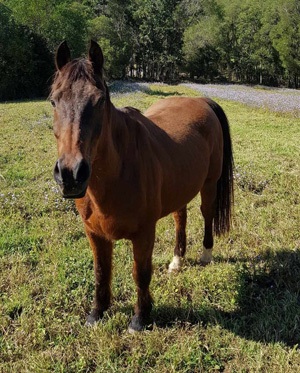
Testimonial Maree B. QLD
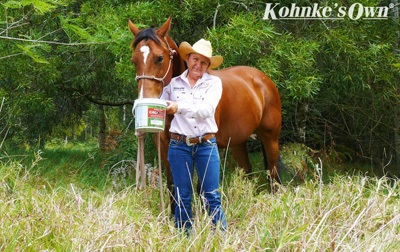
Testimonial Mandy P, QLD
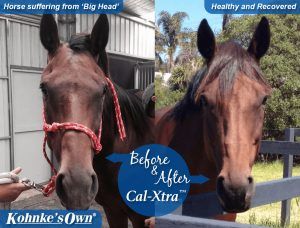
Testimonial Jodie, VIC
“My TB was diagnosed with Bighead in March 2015, on vets advice he was started on Kohnkes Own Cal-XTRA daily in his feed. Within 6 months the swelling had completely disappeared, I highly recommend this product to anyone with a horse showing signs of Big Head. I live on the Victorian coast with lots of high oxalate grass. All our horses now get Cal-XTRA daily to avoid Big Head occurring again.” Jodie, VIC
Related Products

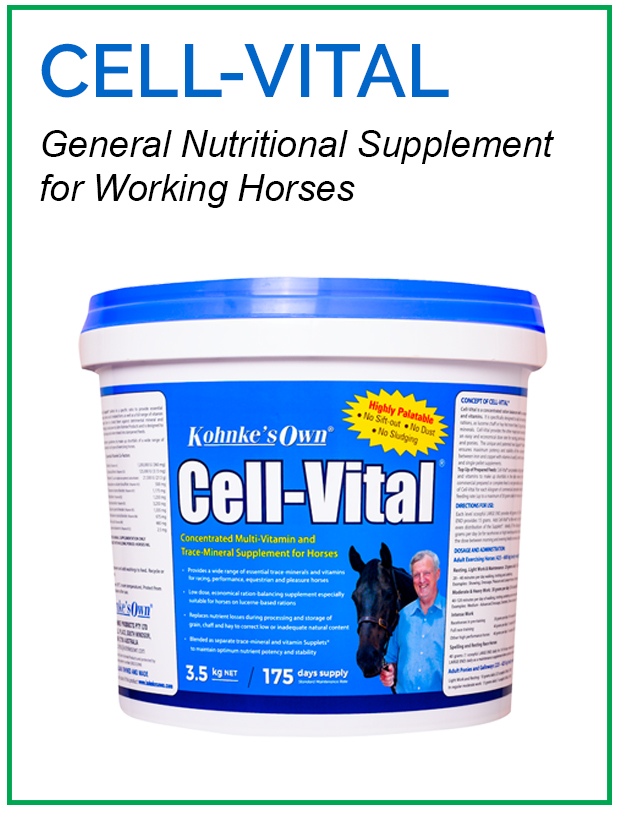
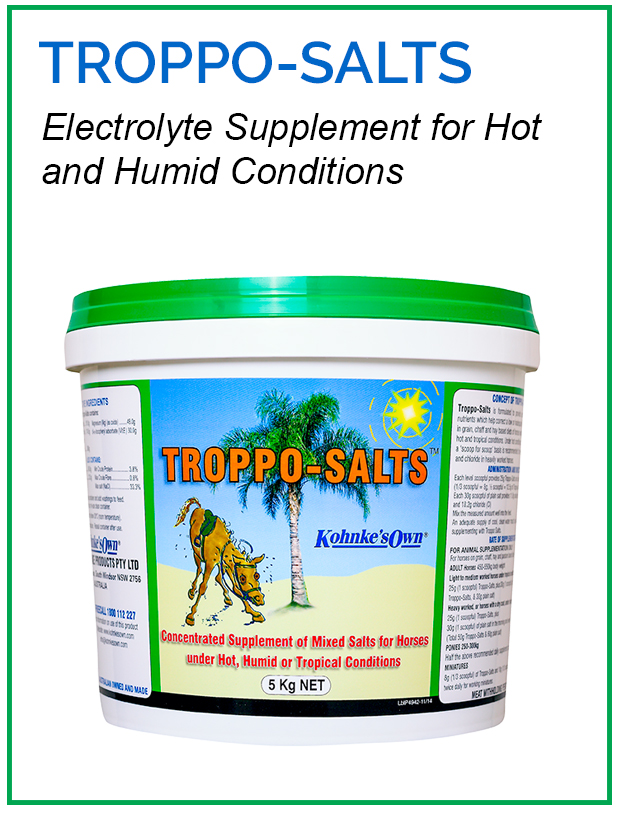
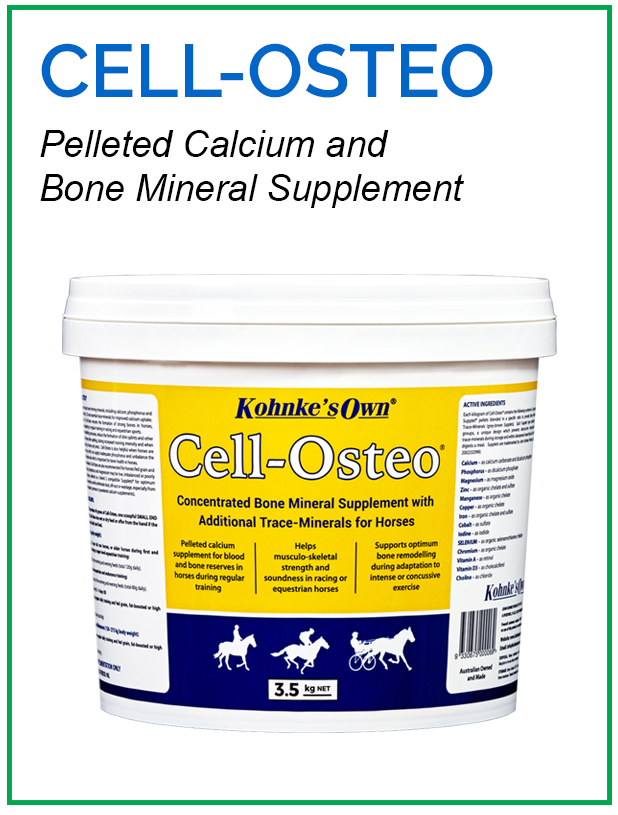
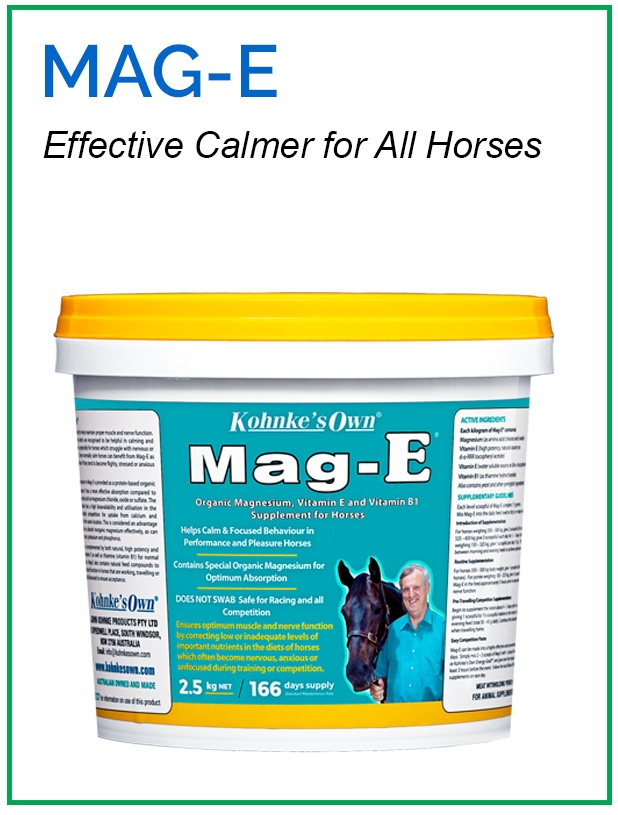


 Facebook
Facebook Instagram
Instagram